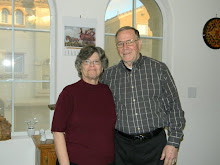Sunday is an exciting day. For one thing it is one of my days off. But more importantly, it is the opportunity to be with brothers and sisters in Christ at church. Today we went as usual to the Northside Baptist Church in North Charleston. But for the worship service, Philip and I decided to be adventuresome and go to the chapel building where the Spanish church meets while the rest of the family went to the English service.
Pastor Alex Millàn, who has been a missionary to Mexico, is now engaged in a church plant with the kind of philosophy that I think a church ought to have--to reach Hispanics, lead them to the Lord, and equip them for ministry while at the same time encouraging their children to integrate into the English congregation. So hopefuly this congregation will be a continuing ministry but also a feeder for the local congregation.
This morning he had a message which was a real challenge to me, because I have often thought about the fact that some non-Christians are even nicer than true believers. He spoke about the source and motivation for the three qualities that ought to be basic in a Christian´s life.
Speaking from I Thess. chapter one, he pointed out that these three qualities are Faith, Love and Hope. Here are the basics of what he shared, with a few interpretive illustrations I have added.
If one is busy working at being good, putting on a good image, it will surely do much for the people around him, but in order for it to be God´s work it must be borne from and motivated by a solid belief in the only One who is truly Good. I recently read something which clearly illustrates this fact. Many millions have been raised by celebrity types who have done concerts for the benefit of assuaging hunger in Africa, fighting AIDS, and many other causes. But the basic tenets of their faith point toward the ¨goodness of man¨, and the motivation is to glorify themselves. How different from the Thessalonians of this passage, and many servants of the Lord since then whose base was their strong belief in God and whose motivation was His Glory!
The second quality has to do with work based on love. Pastor Alex gave a good illustration in comparing the work that a young boy might do. He might spend five or six hours working out at fùtbol (soccer), and not even be tired, but if mom asks him to carry out the garbage his response is "but mom, I'm tired". Why the difference?. Because he loves fùtbol, but not housework. The Thessalonians had shown their faith by doing a labor of love, and they were not even tired! The difference, of course has to do with source of the pull toward this labor. The work involved in soccer came from an inward source of love for the game and a personal motivation to excel, whereas the work involved in carrying out the garbage came from an outward source of a request from mom, and the motivation was either a sense of duty or fear. The Thessalonians were not tired from their work, because its source was from inside, and was motivated by love for the Lord and their brothers and sisters. We read later that they even begged to be included in the privilege of giving to the suffering saints in Jerusalem, though they themselves were in dire straits.
The final quality he mentioned was Hope which is steadfast or which perseveres. This Hope has one source, and that is their union and communion with the Lord Jesus Christ. Its motivation is the knowledge that whatever one may have to go through here on earth is small compared to the glory of our future presence with Him.
This week I will strive to make these three qualities come alive in my life.
Christmas/New Year
3 years ago
